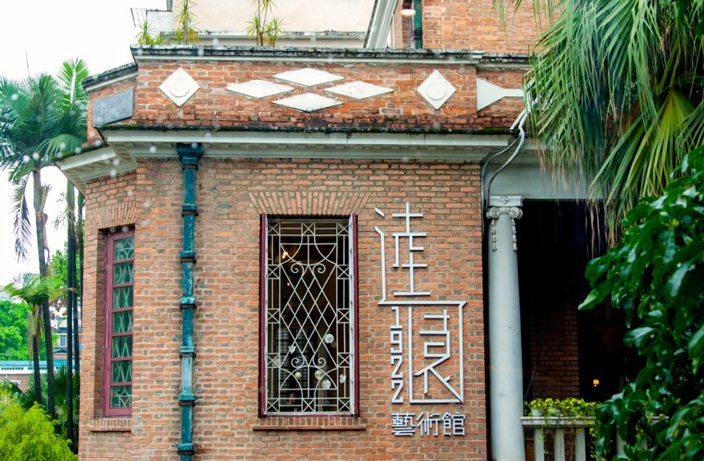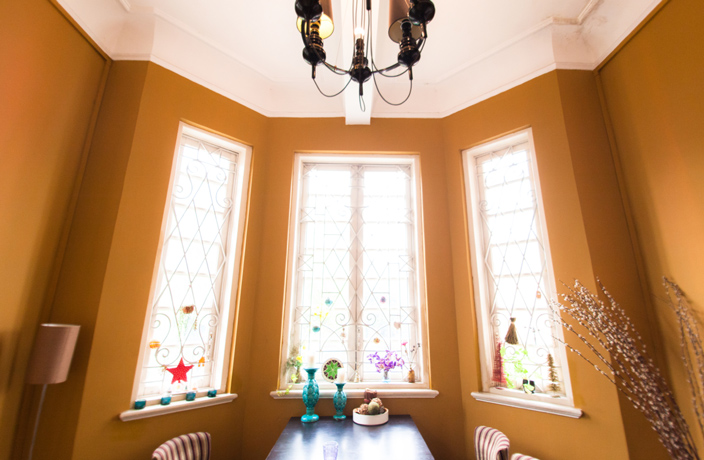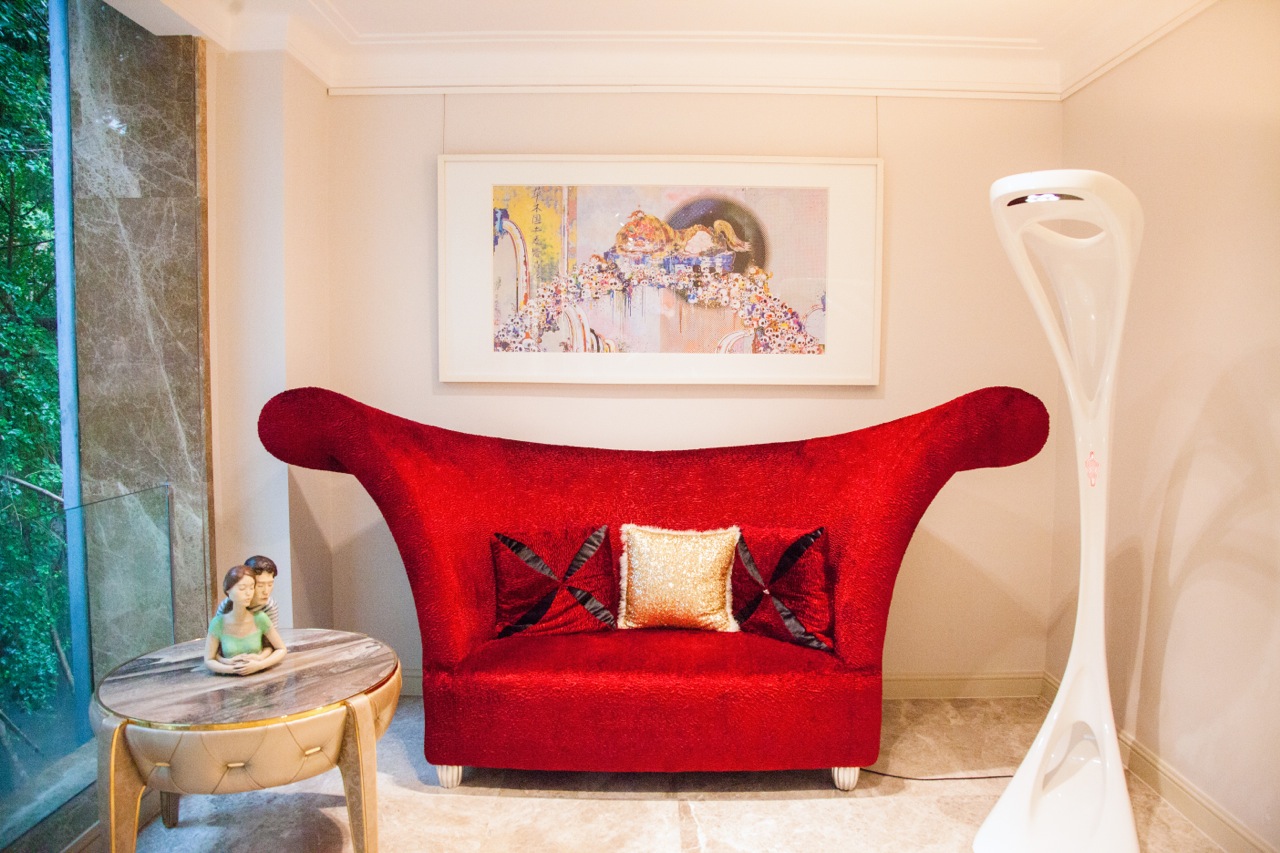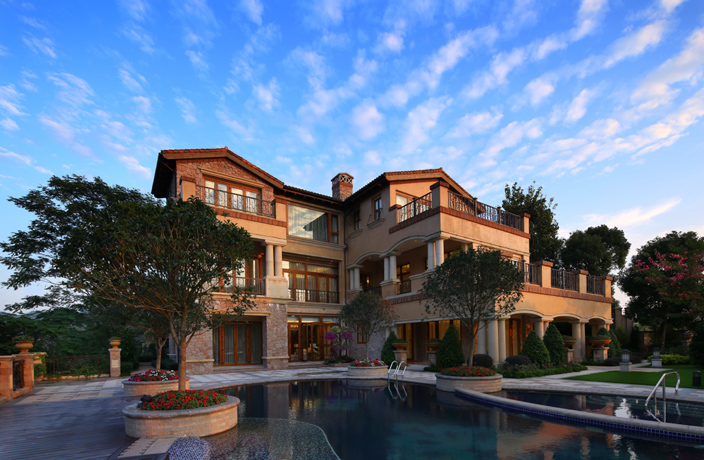This is Part Two in our series on the biggest and baddest cribs in the Pearl River Delta, where we explore the most beautiful homes in the region and the diverse furnishings that make them unique.
Across the city in Dongshankou, exclusivity is reflected in the mere hundreds of brick mansions that remain out of thousands built in the 1920s by returning overseas Chinese.

Modeled after Western residences with subtle elements of art deco, the houses embody a historic charm that’s absent among the freshly painted villas of Dragon Lake.
“We’ve kept most of the home the same,” says Frank Huang, the director of Fei Yuan Gallery – an art center and cafe housed in a private villa built in 1922.
“The floor tiles are all originals, except for a few we’ve replaced. But the staircase, windowpanes, doorways… they’ve been here since the 20s.”

Named a national-level cultural relic in 2012, the house is now protected by the government, which limits how much the owner can alter structurally.
Inside, however, a host of stylistic touches breathe new life into the vintage decor. On the second floor, hand-carved ivory lights dangle from lofty ceilings, illuminating bouquets of lavender and pink carnations accented by dark, mustard-colored walls.
A side balcony and spacious front patio connect to overhanging rooms, letting sunlight seep into the shadowed hallways. The patio furniture, Huang tells us, was custom-designed by students at the Guangzhou Academy of Fine Arts to incorporate patterns found in the original house. Each chair is adorned with an emerald mosaic that matches the shape of the floor tiles, while the chairs’ iron lattice mirrors curvatures in the original windowpanes.

From the second-floor patio, one can spot another mansion just across the street, sitting quaintly behind a wall of slim bamboo. Worth roughly RMB20 million (USD3 million), this one is even glitzier inside – the place took more than two years to decorate, we’re told, and the owner is “not quite done yet.”
“In China, spending two years to renovate is a long, long time,” says Robert Li, the sales manager of the residence (now called MXQ art space) as he invites us inside. “It shows you how meticulous the owner is.”
Zhang Leming, a real estate tycoon from Chaoshan, purchased the house a few years ago as a showroom for his vast collection of antiques and modern art.

Glossy floors, two walls of windows and transparent cabinets give one the feeling of walking on air. A row of Andy Warhol-esque butterfly paintings only adds to the sensation, their rainbow hues complementing a case of polychrome Kon Yutaka coffee accessories across the room.
Here, the furniture was sourced from nearly 10 different countries; the transparent cabinets, for example, were assembled in Dongguan using imported acrylic glass from the UK. Three mismatched titanium bar stools, worth roughly RMB4,000 each, were imported from Spain, while coffee tables inlayed with jade were designed in Shenzhen.
On the first floor, portraits of the previous occupants, influential modern writer Eileen Chang and poet/architect Ling Huiyi, hang prominently – the only two decorations that aren’t for sale.

Upstairs, a cherry sofa from Burberry greets us at the end of a long, iridescent corridor. Beside it sits a futuristic Genesy floor lamp by the great Zaha Hadid (listed at roughly RMB73,600 or USD11,365), head bowed in honor of its designer.

Though pricey, those pieces are the exception. Most of the furnishings – including a rare gilded door from the Ming dynasty – look more expensive than they are.
“That’s what I like about the owner,” Li responds, sensing our surprise at the affordability of some impressive fixtures. “With him, it’s not about the money, it’s all about artistic balance. He likes the idea of perfection.”

We start in the ‘modern’ side of the residence and work our way towards the ‘traditional’ side, comprised of a Zen-inspired massage parlor, private banquet halls with teppanyaki tables and a spacious chamber for steeping tea.
“Zhang loves to fuse Chinese and Japanese elements,” offers Alonso Liu, the managing director. “He sees commonality in the two.”
And perhaps that’s the beauty of owning a crib – having the power to mold one’s private space into virtually any style imaginable.
Click here for more from our ‘Cribs’ series.






















0 User Comments